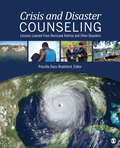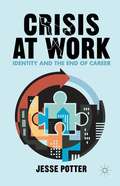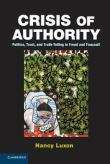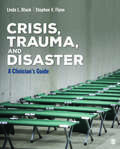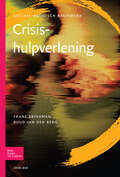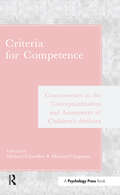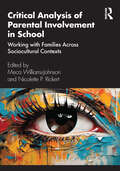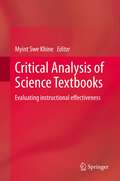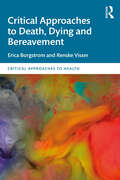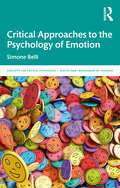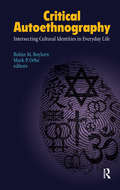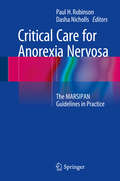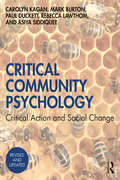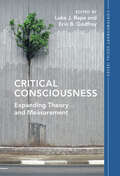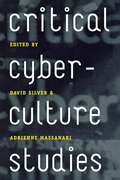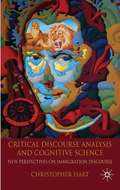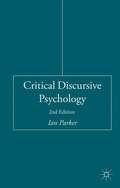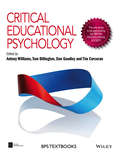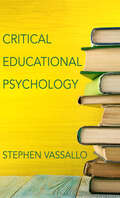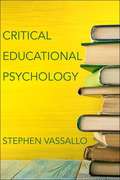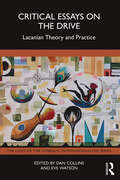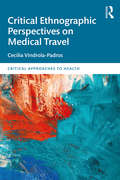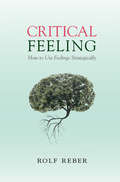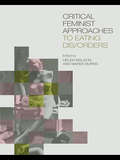- Table View
- List View
Crisis and Disaster Counseling: Lessons Learned From Hurricane Katrina and Other Disasters
by Priscilla Dass-BrailsfordThis text provides professionals with the skills needed to effectively assist survivors of disasters, including Hurricane Katrina, with healing, recovery, and resilience. This comprehensive collection includes powerful, direct accounts of first responders and the organizations they represent. Taking a practical, skill-building approach, it offers clear and pragmatic recommendations to help providers, educators, advocates, and policymakers better understand how to meet the needs of children, families, and communities in the aftermath of disasters. Key Features Provides a substantial review of the current theoretical and research literature on disasters and disaster response Emphasizes multicultural competency in the aftereffects of disasters Uses a practical skill-building approach to develop competencies in crisis workCovers the spiritual dimensions of healing as well as funeral practices to encourage discussion on grief and mourning Intended Audience This book is a must-have reference for mental health practitioners. For graduate students of counseling, psychology, or social work, Crisis and Disaster Counseling will clarify how theory and research can be applied to practice and policy.
Crisis at Work
by Jesse PotterThis book explores how we make sense of ourselves when work is precarious and intrinsically alienating. We know little about how this experience of work impacts the lives of men and women, and less about the way individuals understand themselves in the face of institutions and organizations from which they feel marginalized. Based on the narratives of men and women who underwent extraordinary work life changes, Crisis at Work examines how we negotiate greater meaning and fulfilment when our productive lives fail to sustain and satisfy. Reflecting a growing fracture between what we value, believe in, and are committed to and the degree to which work and career have become incapable of assuaging those desires, Potter examines how individuals attempt to assemble working-lives they find rich and rewarding and how that work is negotiated within the constraints and possibilities of the contemporary moment.
Crisis of Authority
by Nancy LuxonContemporary social and political theory has reached an impasse about a problem that had once seemed straightforward: how can individuals make ethical judgments about power and politics? Crisis of Authority analyzes the practices that bind authority, trust, and truthfulness in contemporary theory and politics. Drawing on newly available archival materials, Nancy Luxon locates two models for such practices in Sigmund Freud's writings on psychoanalytic technique and Michel Foucault's unpublished lectures on the ancient ethical practices of "fearless speech," or parrhesia. Luxon argues that the dynamics provoked by the figures of psychoanalyst and truth-teller are central to this process. Her account offers a more supple understanding of the modern ethical subject and new insights into political authority and authorship.
Crisis, Trauma, and Disaster: A Clinician′s Guide (Counseling and Professional Identity)
by Linda L. Black Stephen V. FlynnCrisis, Trauma, and Disaster: A Clinician′s Guide teaches counselors how to respond and intervene with individuals, groups and organizations. The book begins with a description of the counselor’s role and responsibilities and then presents chapters on crisis, trauma and disasters with corresponding chapters on working with those affected. Each chapter defines the issue and contrasts it with general counseling requirements, and then presents the history and theory as well as common interventions. Each chapter contains The Counselor’s Toolkit and presents assessment, case conceptualization and treatment approaches followed by case illustrations. The text concludes with a chapter on emerging trends and a chapter on caring for those who care.
Crisis, Trauma, and Disaster: A Clinician′s Guide (Counseling and Professional Identity)
by Linda L. Black Stephen V. FlynnCrisis, Trauma, and Disaster: A Clinician′s Guide teaches counselors how to respond and intervene with individuals, groups and organizations. The book begins with a description of the counselor’s role and responsibilities and then presents chapters on crisis, trauma and disasters with corresponding chapters on working with those affected. Each chapter defines the issue and contrasts it with general counseling requirements, and then presents the history and theory as well as common interventions. Each chapter contains The Counselor’s Toolkit and presents assessment, case conceptualization and treatment approaches followed by case illustrations. The text concludes with a chapter on emerging trends and a chapter on caring for those who care.
Crisishulpverlening (Methodisch werken)
by F. Brinkman R. van den BergHulpverleners van uiteenlopende instellingen krijgen te maken met cliënten die in een crisis verkeren. Dit varieert van een plotselinge dakloosheid tot een acute psychose. Ze moeten dan meteen iets doen en klaar staan voor crisishulpverlening. In dit boek geven de auteurs hulpverleners concrete handvatten voor het toepassen van crisishulpverlening. Het accent ligt op de praktijk. Steeds wordt gekeken hoe de hulpverlener algemeen bekende methoden en technieken in zijn werk kan aanwenden om een crisis te verhelpen. Dit wordt ruim geïllustreerd met praktijkvoorbeelden. De basis hiervoor vormen theorieën met betrekking tot crisisinterventie, crisisopvang en acute psychiatrie. De hier beschreven crisishulpverlening integreert deze theorieën.In alle gevallen reikt het boek een kader aan om snel een toestand te beoordelen en voorlopige conclusies te trekken. En om interventies te kiezen om de crisis op korte termijn te verminderen.
Criteria for Competence: Controversies in the Conceptualization and Assessment of Children's Abilities
by Michael Chandler Michael ChapmanOne of developmental psychology's central concerns is the identification of specific "milestones" which indicate what children are typically capable of doing at different ages. Work of this kind has a substantial impact on the way parents, educators, and service-oriented professionals deal with children; and, therefore one might expect that developmentalists would have come to some general agreement in regard to the ways they assess children's abilities. However, as this volume demonstrates, the field appears to suffer from a serious lack of consensus in this area. Based on the premise that identifying relevant issues is a necessary step toward progress, this book addresses a number of vital topics, such as: How could research into fundamental areas (such as the age at which children first acquire a sense of self or learn to reason transitively) repeatedly yield wildly diverse results? Why do experts who hold to radically different views appear to be so unruffled by this same divergence of professional opinion? and, Are there grounds for hope that this divergence of professional opinion is on the wane?
Critical Analysis of Parental Involvement in School: Working with Families Across Sociocultural Contexts
by Meca Williams-Johnson Nicolette P. RickertCritical Analysis of Parental Involvement in School presents in-depth explorations of parental involvement within culturally distinct contexts. As teachers and leaders sense the impact of today’s social and political tensions in their schools, new guidance is needed to help them make decisions, solve problems, clarify interventions, and resolve conflict with their students’ families as they mutually pursue the well-being of diverse students. This edited volume examines parents’ culturally situated goals and values, communication and rearing styles, academic involvement, and other social-psychological factors across identities at the intersection of race, gender, class, and beyond. Each chapter addresses the complexities of a unique demographic context, innovative approaches toward inclusion, methodologies helpful to the study of parental involvement, new trends and directions in family-school partnerships, and more.
Critical Analysis of Science Textbooks: Evaluating instructional effectiveness
by Myint Swe KhineThe critical analysis of science textbooks is vital in improving teaching and learning at all levels in the subject, and this volume sets out a range of academic perspectives on how that analysis should be done. Each chapter focuses on an aspect of science textbook appraisal, with coverage of everything from theoretical and philosophical underpinnings, methodological issues, and conceptual frameworks for critical analysis, to practical techniques for evaluation. Contributions from many of the most distinguished scholars in the field give this collection its sure-footed contemporary relevance, reflecting the international standards of UNESCO as well as leading research organizations such as the American Association for the Advancement of Science (whose Project 2061 is an influential waypoint in developing protocols for textbook analysis). Thus the book shows how to gauge aspects of textbooks such as their treatment of controversial issues, graphical depictions, scientific historiography, vocabulary usage, accuracy, and readability. The content also covers broader social themes such as the portrayal of women and minorities. "Despite newer, more active pedagogies, textbooks continue to have a strong presence in classrooms and to embody students' socio-historical inheritance in science. Despite their ubiquitous presence, they have received relatively little on-going empirical study. It is imperative that we understand how textbooks influence science learning. This book presents a welcome and much needed analysis." Tina A. Grotzer Harvard University, Cambridge, Massachusetts, USA The present book provides a much needed survey of the current state of research into science textbooks, and offers a wide range of perspectives to inform the 'science' of writing better science textbooks. Keith S Taber University of Cambridge, Cambridge, United Kingdom
Critical Approaches to Death, Dying and Bereavement (Critical Approaches to Health)
by Renske Visser Erica BorgstromThis book is the first of its kind to examine key topics in death, dying, and bereavement through a critical lens, highlighting how the understanding and experience of death can vary considerably, based on social, cultural, historical, political, and medical contexts. It looks at the complex ways in which death and dying are managed, from the political level down to end- of- life care, and the inequalities that surround and impact experiences of death, dying, and bereavement.Readers are introduced to key theories, such as the medicalisation of dying, as well as contemporary issues, such as social movements, pandemics, and assisted dying. The book stresses how death is not only a biological process or event but rather shaped by a range of intersecting factors. Issues of inequalities in health, inequities in support, and intersectional analyses are brought to the fore, and each chapter is dedicated to an issue that has interdisciplinary resonance, thus showcasing the wider sociocultural and political factors that impact this time of life.This book is valuable reading for scholars in thanatology and death studies, and for those in related fields such as sociology of health, medical and social anthropology, and interdisciplinary social science courses.
Critical Approaches to the Psychology of Emotion (Concepts for Critical Psychology)
by Simone BelliThis fascinating book explores the different methodologies, resources and strategies that have been used to study emotion, and identifies emerging trends and research perspectives in the field. Emotion is a subject that has been thoroughly investigated in all fields of social and behavioural sciences. And yet the more we have attempted to individualize emotions and set limits that separate the different types of emotions, the more the subject has resisted these categorizations. Mapping the changes and diverse perspectives in the study of emotion, author Simone Belli explores how a critical psychology of emotion has emerged in order to answer this paradox, examining emotions within a social framework. Divided into five chapters, the book uses interdisciplinary critical approaches to cover everything from the interaction between emotion and language, to emotional contagion such as the spread of fear in a pandemic. There is also a particular focus on emotion analysis in digital environments, which have left a deep mark on our lives from the beginning of this century. Showcasing a selection of important investigations that have dealt with the study of emotions in society, Critical Approaches to the Psychology of Emotion is essential reading for students of critical social psychology, sociolinguistics, sociology, anthropology and philosophy.
Critical Autoethnography: Intersecting Cultural Identities in Everyday Life (Writing Lives: Ethnographic Narratives #13)
by Mark P. Orbe Robin M. BoylornThis volume uses autoethnography—cultural analysis through personal narrative—to explore the tangled relationships between culture and communication. Using an intersectional approach to the many aspects of identity at play in everyday life, a diverse group of authors reveals the complex nature of lived experiences. They situate interpersonal experiences of gender, race, ethnicity, ability, and orientation within larger systems of power, oppression, and social privilege. An excellent resource for undergraduates, graduate students, educators, and scholars in the fields of intercultural and interpersonal communication, and qualitative methodology.
Critical Care for Anorexia Nervosa: The MARSIPAN Guidelines in Practice
by Paul H. Robinson Dasha NichollsThis book focuses on the role of the psychiatric, medical, nutritional and psychiatric assessment and management of severely ill patients with anorexia nervosa. Leading clinicians and researchers address the essentials of risk assessment, the identification of complications and the monitoring of treatment progress. Location of care and the role of the team are fully addressed, with due consideration of legal and ethical issues. Practical guidelines are included on risk assessment, management of acute and chronic physical problems, feeding during treatment and consent, as outlined in the MARSIPAN (2010) and Junior MARSIPAN (2012) documents. Critical Care for Anorexia Nervosa will be of value for medical and paediatric teams, GPs, psychiatrists and all health-care professionals involved in the treatment of acutely ill patients with anorexia nervosa.
Critical Community Psychology: Critical Action and Social Change (Bps Textbooks In Psychology Ser. #13)
by Mark Burton Carolyn Kagan Paul Duckett Rebecca Lawthom Asiya SiddiqueeThis accessible textbook draws upon progressions in academic, political and global arenas, to provide a comprehensive overview of practical issues in psychological work across a diverse range of community settings. Interest in community psychology, and its potential as a distinctive approach, is growing and evolving in parallel with societal and policy changes. Thoroughly revised and updated, this new edition covers crucial issues including decolonial approaches, migration, social justice, and the environmental crisis. It has a new chapter on archive research, working with data, policy analysis and development, to reflect the continuously developing global nature of community psychology. Key features include: Sections and chapters organised around thinking, acting and reflecting Case examples and reflections of community psychology in action Discussion points and ideas for exercises that can be undertaken by the reader, in order to extend critical understanding Aiming to provide readers with not only the theories, values and principles of community psychology, but also with the practical guidance that will underpin their community psychological work, this is the ideal resource for any student of community, social, and clinical psychology, social work, community practice, and people working in community-based professions and applied settings.
Critical Consciousness: Expanding Theory and Measurement (Contemporary Social Issues Series)
by Luke J. Rapa Erin B. GodfreyCritical consciousness represents the analysis of inequitable social conditions, the motivation to effect change, and the action taken to redress perceived inequities. Scholarship and practice in the last two decades have highlighted critical consciousness as a key developmental competency for those experiencing marginalization and as a pathway for navigating and resisting oppression. This competency is more urgent than ever given the current sociopolitical moment, in which longstanding inequity, bias, discrimination, and competing ideologies are amplified. This volume assembles leading scholars to address some of the field's most urgent questions: How does critical consciousness develop? What theories can be used to complement and enrich our understanding of the operation of critical consciousness? How might new directions in theory and measurement further enhance what is known about critical consciousness? It offers cutting-edge ideas and answers to these questions that are of critical importance to deepen our critical consciousness theory and measurement.
Critical Cyberculture Studies
by David Silver Adrienne MassanariStarting in the early 1990s, journalists and scholars began responding to and trying to take account of new technologies and their impact on our lives. By the end of the decade, the full-fledged study of cyberculture had arrived. Today, there exists a large body of critical work on the subject, with cutting-edge studies probing beyond the mere existence of virtual communities and online identities to examine the social, cultural, and economic relationships that take place online.Taking stock of the exciting work that is being done and positing what cyberculture’s future might look like, Critical Cyberculture Studies brings together a diverse and multidisciplinary group of scholars from around the world to assess the state of the field. Opening with a historical overview of the field by its most prominent spokesperson, it goes on to highlight the interests and methodologies of a mobile and creative field, providing a much-needed how-to guide for those new to cyberstudies. The final two sections open up to explore issues of race, class, and gender and digital media's ties to capital and commerce—from the failure of dot-coms to free software and the hacking movement.This flagship book is a must-read for anyone interested in the dynamic and increasingly crucial study of cyberculture and new technologies.
Critical Discourse Analysis and Cognitive Science: New Perspectives on Immigration Discourse
by Christopher HartThis study advances a model for Critical Discourse Analysis which draws on Evolutionary Psychology and Cognitive Linguistics, applied in a critical analysis of immigration discourse. It will be of special interest to students and researchers with which to explore new perspectives in CDA.
Critical Discursive Psychology
by Ian ParkerCritical Discursive Psychology addresses issues in critical discursive research in psychology, and outlines the historical context in the discipline for the emergence of qualitative debates. Key critical theoretical resources are described and assessed and a series of polemics is staged that brings together writers who have helped shape critical work in psychology. It also sets out methodological steps for critical readings of texts and arguments for the role of psychoanalytic theory in qualitative research.
Critical Educational Psychology
by Dan Goodley Antony J. Williams Tom Billington Tim CorcoranThe first textbook of its kind, Critical Educational Psychology is a forward-thinking approach to educational psychology that uses critical perspectives to challenge current ways of thinking and improve practice.
Critical Educational Psychology: An Application Of Critical Educational Psychology (Educational Psychology Ser. #15)
by Stephen VassalloIntroducing students and scholars to the emerging field of critical educational psychology.The field of critical studies recognizes that all knowledge is deeply embedded in ideological, cultural, political, and historical contexts. Although this approach is commonly applied in other subfields of psychology, educational psychology—which is the study of human learning, thinking, and behavior in formal and informal educational contexts—has resisted a comprehensive critical appraisal. In Critical Educational Psychology, Stephen Vassallo seeks to correct this deficit by demonstrating how the psychology of learning is neither neutral nor value-free but rather bound by a host of contextual issues and assumptions. Vassallo invites teachers and teacher educators, educational researchers, and educational psychologists to think broadly about the implications that their use of psychology has on the teaching and learning process. He applies a wide variety of interdisciplinary approaches to examine the psychology of learning, cognitive development, motivation, creativity, discipline, and attention. Drawing on multiple perspectives within psychology and critical theory, he reveals that contemporary educational psychology is entangled in and underpinned by specific political, ideological, historical, and cultural contexts.A valuable resource for anyone who relies on psychology to interact with, assess, and deliberate over others, especially school-aged children, Critical Educational Psychology resists neatly packaged theories, models, and perspectives that are intended to bring some basis and certainty to pedagogical decision-making. This book will enhance teachers’ ethical decision-making and start important new conversations about power and opportunity.
Critical Educational Psychology: An Examination of Foundational Features of the Field
by Stephen VassalloThe field of critical studies recognizes that all knowledge is deeply embedded in ideological, cultural, political, and historical contexts. Although this approach is commonly applied in other subfields of psychology, educational psychology--which is the study of human learning, thinking, and behavior in formal and informal educational contexts--has resisted a comprehensive critical appraisal. In Critical Educational Psychology, Stephen Vassallo seeks to correct this deficit by demonstrating how the psychology of learning is neither neutral nor value-free but rather bound by a host of contextual issues and assumptions. Vassallo invites teachers and teacher educators, educational researchers, and educational psychologists to think broadly about the implications that their use of psychology has on the teaching and learning process. He applies a wide variety of interdisciplinary approaches to examine the psychology of learning, cognitive development, motivation, creativity, discipline, and attention. Drawing on multiple perspectives within psychology and critical theory, he reveals that contemporary educational psychology is entangled in and underpinned by specific political, ideological, historical, and cultural contexts. A valuable resource for anyone who relies on psychology to interact with, assess, and deliberate over others, especially school-aged children, Critical Educational Psychology resists neatly packaged theories, models, and perspectives that are intended to bring some basis and certainty to pedagogical decision-making. This book will enhance teachers' ethical decision-making and start important new conversations about power and opportunity.
Critical Essays on the Drive: Lacanian Theory and Practice (The Lines of the Symbolic in Psychoanalysis Series)
by Dan Collins Eve WatsonThis thorough text provides a complete overview of the drive in Lacanian psychoanalysis.Divided into four key areas, the book considers clinical, theoretical, historical, and cultural aspects of the drive, with editorial headnotes throughout. The introduction to the collection provides a comprehensive overview of the theory and history of the drive as a concept and is followed by discussion of clinical cases. Critical Essays on the Drive then assesses theoretical aspects, with chapters by world-leading Lacanian scholars. The final parts of the book explore the history of drive theory and its impact on art and culture, debunking the notion that the drive is a dormant or defunct concept and considering its applications by artists, academics, and cultural theorists.Critical Essays on the Drive will be essential reading for psychoanalysts, psychologists, psychotherapists, and psychiatrists in practice and in training. It will also be of great interest to academics and scholars of psychoanalytic and Lacanian theory, critical theory, and cultural theory.
Critical Ethnographic Perspectives on Medical Travel (Critical Approaches to Health)
by Cecilia Vindrola PadrosBy taking an ethnographic approach to medical travel, this important book uses critical perspectives to understand inequalities in healthcare access and delivery, including gender, class and ethnicity, and explore how these are negotiated. In this key text Vindrola- Padros presents a comprehensive overview of the work carried out on this topic to date, highlights the gaps that remain and suggests strategies for enriching medical travel research in the future. Drawing from the author’s research on internal medical travel to access pediatric oncology treatment in Buenos Aires, Argentina and other research from across the globe, this book presents four dimensions of medical travel that can be explored through a critical (im)mobilities lens: infrastructures, differential mobility empowerments, culture and affective dimensions of care and travel. Vindrola-Padros encourages the reader to critically explore processes of medical travel by considering the structures that shape travel, individual capacities for travel, the role emotions play in decisions and experiences of movement and service delivery and the ways in which culture(s) influence both travel and care. This book will be important reading for scholars across medical sociology, anthropology and critical health studies.
Critical Feeling
by Rolf ReberHow can we develop the sensitivity necessary for playing music or making crafts? How can teachers make their lessons interesting? In what ways can consumers avoid undue influence? How do we acquire refined tastes, or come to believe what we want to believe? Addressing these issues and providing an account for tackling personal and societal problems, Rolf Reber combines insights from psychology, philosophy, and education to introduce the concept of 'critical feeling'. While many people are familiar with the concept of critical thinking, critical feeling denotes the strategic use of feelings in order to optimize an outcome. Reber discusses the theoretical and empirical foundations of critical feeling and provides an overview of applications, including well-being, skill learning, personal relationships, business, politics, school, art, morality, and religion. This original and thought-provoking study will interest a broad range of researchers, students, and practitioners.
Critical Feminist Approaches to Eating Dis/Orders
by Helen MalsonOver the past decade there have been significant shifts both in feminist approaches to the field of eating disorders and in the ways in which gender, bodies, body weight, body management and food are understood, represented and regulated within the dominant cultural milieus of the early twenty-first century. Critical Feminist Approaches to Eating Dis/Orders addresses these developments, exploring how eating disordered subjectivities, experiences and body management practices are theorised and researched within postmodern and post-structuralist feminist frameworks. Bringing together an international range of cutting-edge, contemporary feminist research and theory on eating disorders, this book explores how anorexia nervosa, bulimia nervosa and obesity cannot be adequately understood in terms of individual mental illness and deviation from the norm but are instead continuous with the dominant cultural ideas and values of contemporary cultures. This book will be essential reading for academic, graduate and post-graduate researchers with an interest in eating disorders and critical feminist scholarship, across a range of disciplines including psychology, sociology, cultural studies and gender studies as well as clinicians interested in exploring innovative theory and practice in this field.
